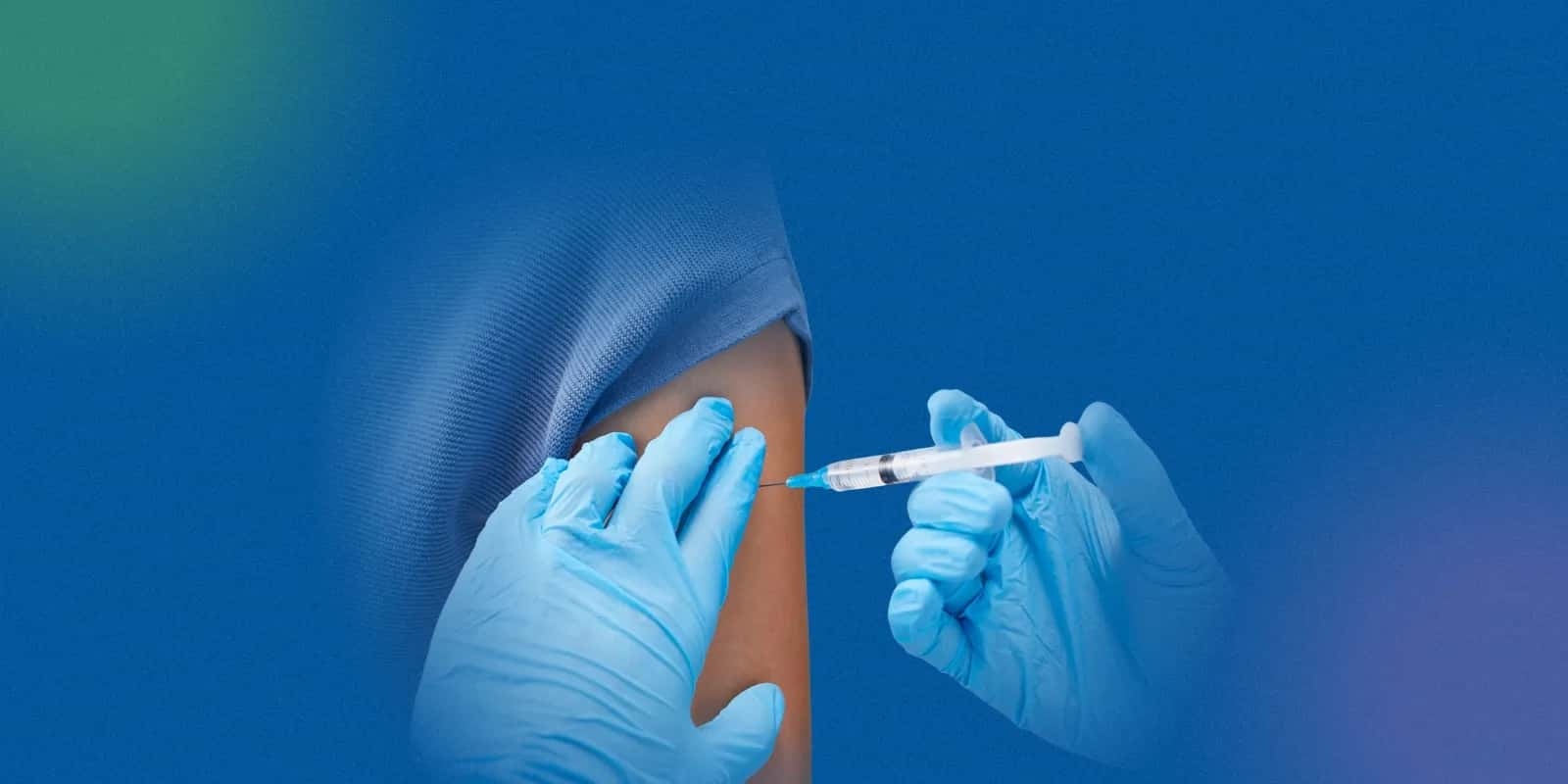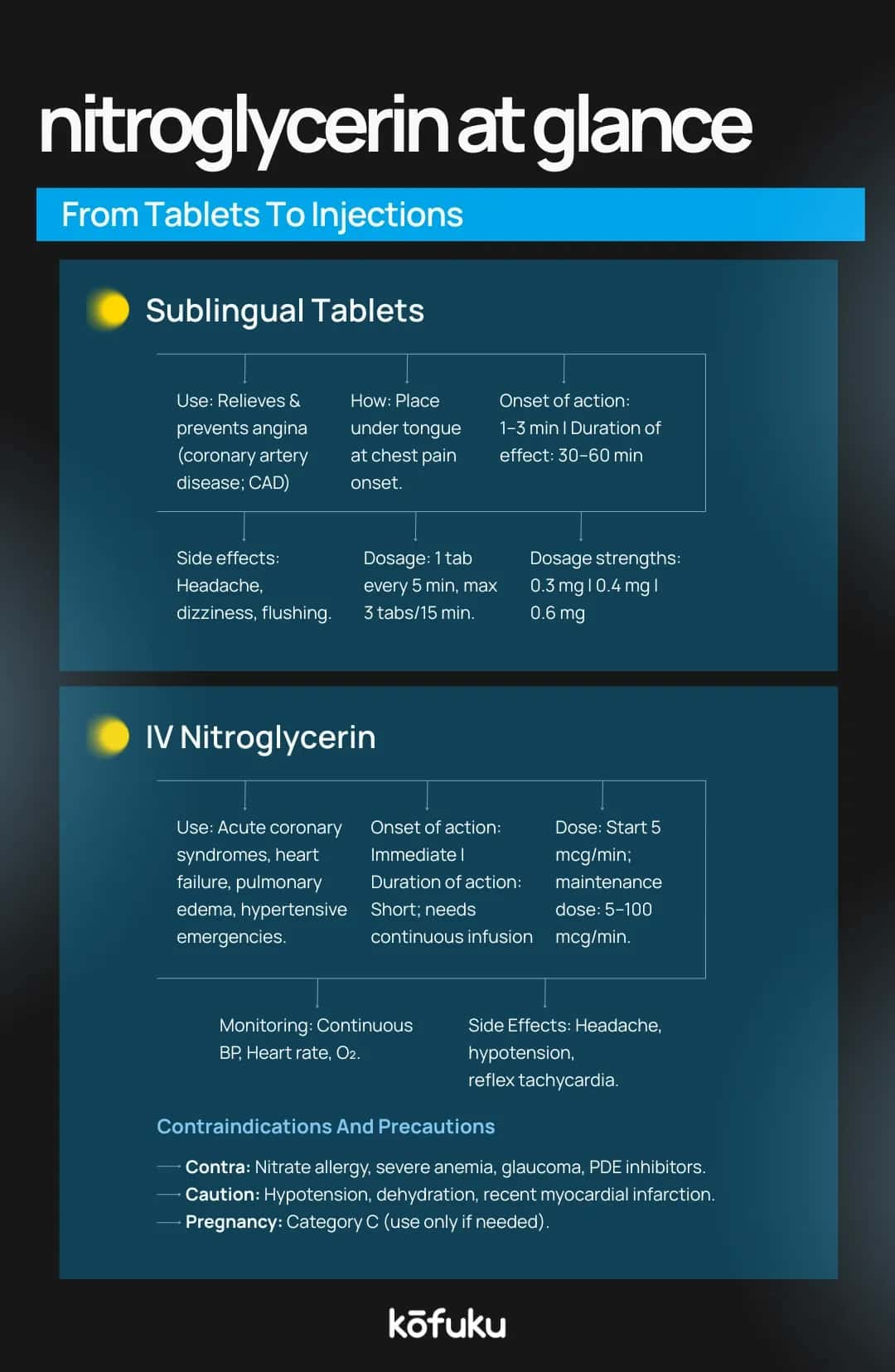Nitroglycerin Tablets and Injections: Everything You Should Know

Introduction
Have you noticed how patients in India with chest pain usually get a small tablet in their hands, which they are supposed to put under the tongue? Or how a hospital can get an infusion administered in a short period of time when somebody comes in with a possible heart attack?
Both of these life-saving techniques usually entail nitroglycerin tablets or an injection of nitroglycerin.
Although it is one of the most solidified therapies in cardiology, many patients remain uncertain about its performance, the forms it takes, or who should or should not undergo it.
This guide offers a clear explanation of nitroglycerin tablets and injections, their clinical role, how they are prescribed, and what precautions patients should keep in mind.
What Is Nitroglycerin and How Does It Work in the Body?
Nitroglycerin falls into the nitrates drug category. It acts to dilate and increase the diameter of blood vessels, making it easier on the heart and improving circulation. The mechanism reduces chest pain due to inadequate oxygen, which is observed primarily in heart attacks.
The action of smooth muscles acutely promotes the alleviation of cardiac pain when it is consumed as a dissolved tablet under the tongue, or as a nitroglycerin injection. There are longer-acting preparations, e.g. controlled-release tablets of nitroglycerin, that provide relief of chronic conditions.
Types of Nitroglycerin Forms Available
Nitroglycerin is not a universal drug. According to the urgency, the longevity of treatment, and clinical locations, physicians can administer various versions.
Oral and Sublingual Nitroglycerin Tablets
The most popular type is the sublingual tablet made with the intention of being dissolved below the tongue. It is conventionally utilised to treat acute attacks of angina in a few minutes. It is recommended that patients carry it with them at all times. Oral tablets can serve as a treatment for maintenance. They are slower in their action, but their effect is longer than that of a sublingual tablet.
####Nitroglycerin Controlled Release Tablets 2.6 mg
Sustained relaxation of blood vessels and consistency of relaxation are required in the treatment of chronic ailments like stable angina. To this end, nitroglycerin controlled-release tablets 2.6 mg are frequently used.
These sustained-release pills of nitroglycerin take action slowly, which helps to eliminate frequent bouts of angina.
Nitroglycerin 2.6 has applications in the prevention of problems on a long-term basis and not for relief. Patients should not chew or crush them, because this interferes with their sustained-release system.
####Nitroglycerin Injection (Inj Nitroglycerin)
Doctors usually use nitroglycerin injection in an emergency. Hospital establishment depends upon nitroglycerin injections or generic nitroglycerin in acute coronary syndrome, advanced heart failure, and uncontrolled hypertension in the operating room.
It is administered intravenously to ensure rapid absorption and immediate response to this parenteral route when oral tablets are ineffective and unsafe.

NTG Infusion Dose and Clinical Settings
Optimally, doctors use a calculated dose of infusing NTG, initially low, which can be adjusted upward based on blood pressure, heart rate, and the patient's reaction to the drug. An intravenous infusion is routine in intensive care units and operating theatres.
The infusion is used for:
- Managing acute myocardial infarction (heart attack)
- Controlling blood pressure during cardiac surgery
- Severe pulmonary edema and heart failure
Because infusions work so quickly, infusions must be closely monitored to prevent blood pressure from becoming too low.
Uses of Nitroglycerin Tablets and Injections
Nitroglycerin is one of the most versatile nitrate drugs. Its major uses include:
- Relieving acute angina attacks with sublingual dissolve tablets
- Preventing frequent angina with nitroglycerin controlled-release tablets
- Managing acute coronary syndromes and heart failure with nitroglycerin injection
- Controlling intraoperative hypertension with intravenous infusion
Even some conservative systems in India draw the parallel of the speed of its action with the natural dilators, such as herbs or the advantages of the edible gum. Still, nitroglycerin is the mainstream in contemporary cardiology.
Dosage Instructions and Safety Precautions
Dosage depends on the form prescribed and the patient’s condition.
Sublingual (Dissolve Tablet) Dosage
Patients are instructed to place a single piece of a dissolved tablet under the tongue as soon as they begin to experience chest pains. Relief typically takes place after 1-5 minutes. In cases where pain lingers, a second tablet can be used, but medical attention should then follow if pain persists.
Controlled Release Tablet Guidelines
In long-term management, nitroglycerin sustained-release tablets 2.6 mg are administered orally, at least once or twice a day. Patients must not abruptly stop treatment, as it could aggravate the symptoms of angina.
Injection and Infusion Safety
The use of Nitrocin injection is limited to the hospital setting only, but there, the medication dose of NTG in the process of infusion is calculated with care. Blood pressure, heart rhythm, and the occurrence of headaches are monitored in patients. No injections are self-administered.

Possible Side Effects of Nitroglycerin Tablets and Injections
Like most medicines, nitroglycerin may cause side effects. Common ones include:
- Headache (most frequent and dose-dependent)
- Dizziness or light-headedness
- Flushing of the face
- Low blood pressure, especially when standing
- Nausea
Severe allergies, including fainting, rapid heartbeat, or chest pains, which fail to improve, should be medically attended to.
Who Should Avoid Nitroglycerin Drugs?
Certain individuals should avoid nitroglycerin unless cleared explicitly by a doctor. Contraindications include:
- Patients taking erectile dysfunction drugs like sildenafil (risk of severe blood pressure drop)
- People with very low blood pressure or shock
- Patients with certain types of heart muscle thickening
- Severe anaemia
- Recent head trauma or increased intracranial pressure
Nitroglycerin must be prescribed to patients with complete knowledge of the medications they are taking and their health problems, before the medicine is actually prescribed.
Nitroglycerin and Other Nitrate Drugs Comparison
Nitroglycerin is just a drug; amongst other nitrate medications, it is the most popular. Others are isosorbide dinitrate/mononitrate, which are usually employed in long-term prevention. Compared with these, nitroglycerin offers:
- Faster relief in emergency settings via a dissolve tablet or injectable nitroglycerin
- Greater flexibility with multiple forms (tablets, sprays, injections, patches)
- Established role in acute cardiac care worldwide
Combining or rotating nitrate therapies helps doctors prevent tolerance and allows a patient to benefit chronically.

FAQs
Q. What is a nitroglycerin tablet used for in heart patients?
A. A nitroglycerin tablet is prescribed to relieve chest pain (angina) caused by reduced blood flow to the heart. It relaxes blood vessels, improves oxygen supply, reduces cardiac workload, and helps patients manage sudden or chronic angina episodes effectively.
Q. How does a sublingual nitroglycerin tablet dissolve and work?
A. A sublingual dissolve tablet is placed under the tongue, where it rapidly dissolves and absorbs into the bloodstream. This bypasses digestion, providing quick relief by dilating coronary arteries, lowering heart strain, and improving oxygen delivery to the cardiac muscles.
Q. What is the correct dose for nitroglycerin controlled-release tablets 2.6 mg?
A. The typical dose for nitroglycerin controlled-release tablets, 2.6 mg, is one tablet taken once or twice daily, depending on medical advice. These tablets provide slow, sustained release of nitroglycerin to prevent angina, not to treat sudden chest pain.
Q. What is nitroglycerin injection, and when is nitroglycerin given?
A. A nitroglycerin injection (inj nitroglycerin) is administered intravenously in hospitals for acute chest pain, heart attacks, or severe high blood pressure. It provides rapid vasodilation, ensuring controlled management of cardiovascular emergencies under strict monitoring by healthcare professionals.
Q. What are the uses of Nitrocefin injection for patients?
A. Nitrocin injection uses include emergency management of angina, heart attack, and severe hypertension. It helps relax blood vessels, lower cardiac workload, and improve blood flow. It is given intravenously in critical care settings, under specialist supervision for patient safety.
Q. What is the NTG infusion dose in a hospital setting?
A. The NTG infusion dose usually begins at 5 micrograms per minute intravenously and may be gradually increased, depending on patient response. Infusions are carefully titrated in hospitals to relieve angina, heart failure, or hypertension crises, while monitoring vital parameters.
Q. What are nitrates, and where does nitroglycerin fit in?
A. Nitrates are vasodilators used to treat heart conditions by widening blood vessels and reducing cardiac stress. Nitroglycerin is the most commonly prescribed nitrate, available in tablets, controlled-release, and injections, playing a central role in angina and cardiac care.
Q. What are the common side effects of nitroglycerin tablets?
A. Common side effects of nitroglycerin tablets include headaches, dizziness, flushing, and low blood pressure. Some patients may also experience nausea or fainting. These effects occur due to blood vessel dilation and often reduce as the body adjusts to treatment.

Comprehensive Guide to Cefpodoxime Syrup and Tablets: Dosage, Benefits, and Uses

Terbinafine Tablets: What They Are and How They Work

Loperamide Tablet: Complete Guide on Uses, Dosage, Price & Brands in India


